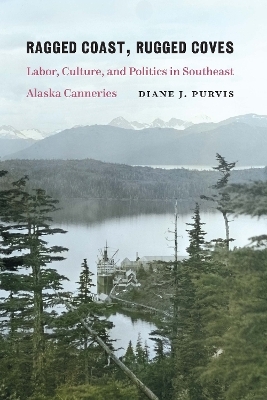
Ragged Coast, Rugged Coves
Labor, Culture, and Politics in Southeast Alaska Canneries
Seiten
2021
University of Nebraska Press (Verlag)
978-1-4962-2588-7 (ISBN)
University of Nebraska Press (Verlag)
978-1-4962-2588-7 (ISBN)
Ragged Coast, Rugged Coves explores the untold story of cannery workers in Southeast Alaska from 1878 through the Cold War, particularly how making a living was pitted against the economic realities of the day.
Ragged Coast, Rugged Coves explores the untold story of cannery workers in Southeast Alaska from 1878, when the first cannery was erected on the Alexander Archipelago, through the Cold War. The cannery jobs brought waves of immigrants, starting with Chinese, followed by Japanese, and then Filipino nationals. Working alongside these men were Alaska Native women, trained from childhood in processing salmon. Because of their expertise, these women remained the mainstay of employment in these fish factories for decades while their husbands or brothers fished, often for the same company.
Canned salmon was territorial Alaska’s most important industry. The tax revenue, though meager, kept the local government running, and as corporate wealth grew, it did not take long for a mix of socioeconomic factors and politics to affect every aspect of the lands, waters, and population. During this time the workers formed a bond and shared their experiences, troubles, and joys. Alaska Natives and Chinese, Japanese, and Filipino immigrants brought elements from their ethnic heritage into the mix, creating a cannery culture.
Although the labor was difficult and frequently unsafe, the cannery workers and fishermen were not victims. When they saw injustice, they acted on the threat. In the process, the Tlingits and Haidas, clans of Southeast Alaska for more than ten thousand years, aligned their interests with Filipino activists and the union movement. Ragged Coast, Rugged Coves tells the powerful story of diverse peoples uniting to triumph over adversity.
Ragged Coast, Rugged Coves explores the untold story of cannery workers in Southeast Alaska from 1878, when the first cannery was erected on the Alexander Archipelago, through the Cold War. The cannery jobs brought waves of immigrants, starting with Chinese, followed by Japanese, and then Filipino nationals. Working alongside these men were Alaska Native women, trained from childhood in processing salmon. Because of their expertise, these women remained the mainstay of employment in these fish factories for decades while their husbands or brothers fished, often for the same company.
Canned salmon was territorial Alaska’s most important industry. The tax revenue, though meager, kept the local government running, and as corporate wealth grew, it did not take long for a mix of socioeconomic factors and politics to affect every aspect of the lands, waters, and population. During this time the workers formed a bond and shared their experiences, troubles, and joys. Alaska Natives and Chinese, Japanese, and Filipino immigrants brought elements from their ethnic heritage into the mix, creating a cannery culture.
Although the labor was difficult and frequently unsafe, the cannery workers and fishermen were not victims. When they saw injustice, they acted on the threat. In the process, the Tlingits and Haidas, clans of Southeast Alaska for more than ten thousand years, aligned their interests with Filipino activists and the union movement. Ragged Coast, Rugged Coves tells the powerful story of diverse peoples uniting to triumph over adversity.
Diane J. Purvis taught cultural history at Alaska Pacific University for twenty-five years. She is the author of The Drive of Civilization: The Stikine Forest versus Americanism.
List of Illustrations
Introduction
1. A Time before the Salmon Cans
2. The Tin Can Men
3. Metlakatla and the Tsimshian
4. From Norwegian Fjords to Alaskan Glaciers
5. Salmon and the Politics of Corporate Capitalism
6. The Immigrants Are Necessary but Unwelcome
7. The Rising Voices of Alaska Natives
8. The Alaskeros
9. Fighting Back with Unions in the 1930s
10. A Union of Their Own
11. The Inequities of War
12. The Hanna Hearings and Hydaburg
13. The Cannery Period Heyday Wanes
14. When Cannery Children Remember
Notes
Bibliography
Index
| Erscheinungsdatum | 20.08.2021 |
|---|---|
| Zusatzinfo | 10 photographs, 1 map, index |
| Verlagsort | Lincoln |
| Sprache | englisch |
| Maße | 152 x 229 mm |
| Themenwelt | Sachbuch/Ratgeber ► Geschichte / Politik ► Allgemeines / Lexika |
| Sachbuch/Ratgeber ► Geschichte / Politik ► Regional- / Landesgeschichte | |
| Geisteswissenschaften ► Geschichte ► Regional- / Ländergeschichte | |
| Geschichte ► Teilgebiete der Geschichte ► Kulturgeschichte | |
| Sozialwissenschaften ► Ethnologie | |
| Sozialwissenschaften ► Soziologie | |
| Wirtschaft | |
| ISBN-10 | 1-4962-2588-0 / 1496225880 |
| ISBN-13 | 978-1-4962-2588-7 / 9781496225887 |
| Zustand | Neuware |
| Haben Sie eine Frage zum Produkt? |
Mehr entdecken
aus dem Bereich
aus dem Bereich
der stille Abschied vom bäuerlichen Leben in Deutschland
Buch | Hardcover (2023)
C.H.Beck (Verlag)
CHF 32,15
vom Mittelalter bis zur Gegenwart
Buch | Softcover (2024)
C.H.Beck (Verlag)
CHF 16,80


